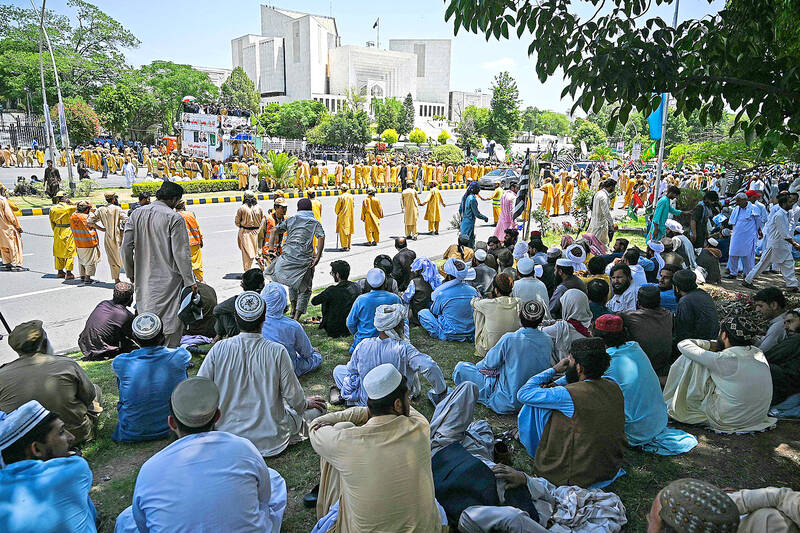Convoys of buses and vehicles filled with government supporters yesterday flooded the main road leading to Islamabad to protest the release of former Pakistani prime minister Imran Khan.
Thousands made their way to the Supreme Court for a rare sit-in against its decision to give Khan, now opposition leader, an “undue reprieve” following his arrest in a graft case. Khan, 70, was released on bail and given protection from arrest until later this month.
The call to protest was a sign of escalating tensions between the judiciary and the government of Pakistani Prime Minister Shahbaz Sharif, who replaced Khan after his ouster in a no-confidence vote in parliament in April last year.

Photo: AFP
Pakistan Democratic Movement, an alliance of 13 political parties affiliated with the ruling Pakistan Muslim League, had called for the sit-in. The radical Islamist political party Jamiat-e-Ulema-Islam is leading the protest call.
Pakistan People’s Party, led by Bilawal Bhutto Zardari — the son of assassinated prime minister Benazir Bhutto — also joined the alliance’s protest.
The call to protest came, despite a ban on rallies and public gatherings that the government imposed in the wake of the crisis.
“Our peaceful protest is against Chief Justice [Umar Ata Bandial] for facilitating the release of Imran Khan,” Pakistan Democratic Alliance head Fazalur Rehman said.
As he spoke, more than 3,000 supporters had already gathered near the sprawling court building.
In a televised statement, Pakistani Minister of Defence Khawaja Mohammad Asif accused the Supreme Court of siding with Khan. He suggested the court “examine the conduct of the chief justice” and take legal action against him.
From his home in the eastern city of Lahore, where he returned to following his release, Khan yesterday wrote on Twitter that the sit-in was being orchestrated to remove the chief justice.
Khan was dramatically arrested from a courtroom in Islamabad and dragged out by agents of the National Accountability Bureau on Tuesday last week on charges of accepting millions of dollars of property in exchange for providing benefits to a real-estate tycoon.
Khan’s arrest triggered a wave of violent protests across Pakistan. Supporters of Khan and his Pakistan Tahreek-e-Insaf party clashed with police, set fire to scores of police vehicles and burned down government buildings and even military facilities, including the residence of a top regional army commander in the eastern city of Lahore.
Khan was expected to appear in court in Lahore later yesterday, along with his wife, Bushra Bibi, to seek bail and protection from arrest in terrorism cases filed against him because of last week’s violence instigated by his supporters.
Bibi also faces possible arrest in the case related to Malik Riaz, the business tycoon, as both she and Khan are implicated in real-estate acquisition from the magnate during Khan’s term in office. Khan has denied the allegations.

POLITICAL PRISONERS VS DEPORTEES: Venezuela’s prosecutor’s office slammed the call by El Salvador’s leader, accusing him of crimes against humanity Salvadoran President Nayib Bukele on Sunday proposed carrying out a prisoner swap with Venezuela, suggesting he would exchange Venezuelan deportees from the US his government has kept imprisoned for what he called “political prisoners” in Venezuela. In a post on X, directed at Venezuelan President Nicolas Maduro, Bukele listed off a number of family members of high-level opposition figures in Venezuela, journalists and activists detained during the South American government’s electoral crackdown last year. “The only reason they are imprisoned is for having opposed you and your electoral fraud,” he wrote to Maduro. “However, I want to propose a humanitarian agreement that

ECONOMIC WORRIES: The ruling PAP faces voters amid concerns that the city-state faces the possibility of a recession and job losses amid Washington’s tariffs Singapore yesterday finalized contestants for its general election on Saturday next week, with the ruling People’s Action Party (PAP) fielding 32 new candidates in the biggest refresh of the party that has ruled the city-state since independence in 1965. The move follows a pledge by Singaporean Prime Minister Lawrence Wong (黃循財), who took office last year and assumed the PAP leadership, to “bring in new blood, new ideas and new energy” to steer the country of 6 million people. His latest shake-up beats that of predecessors Lee Hsien Loong (李顯龍) and Goh Chok Tong (吳作棟), who replaced 24 and 11 politicians respectively

Young women standing idly around a park in Tokyo’s west suggest that a giant statue of Godzilla is not the only attraction for a record number of foreign tourists. Their faces lit by the cold glow of their phones, the women lining Okubo Park are evidence that sex tourism has developed as a dark flipside to the bustling Kabukicho nightlife district. Increasing numbers of foreign men are flocking to the area after seeing videos on social media. One of the women said that the area near Kabukicho, where Godzilla rumbles and belches smoke atop a cinema, has become a “real

‘WATER WARFARE’: A Pakistani official called India’s suspension of a 65-year-old treaty on the sharing of waters from the Indus River ‘a cowardly, illegal move’ Pakistan yesterday canceled visas for Indian nationals, closed its airspace for all Indian-owned or operated airlines, and suspended all trade with India, including to and from any third country. The retaliatory measures follow India’s decision to suspend visas for Pakistani nationals in the aftermath of a deadly attack by shooters in Kashmir that killed 26 people, mostly tourists. The rare attack on civilians shocked and outraged India and prompted calls for action against their country’s archenemy, Pakistan. New Delhi did not publicly produce evidence connecting the attack to its neighbor, but said it had “cross-border” links to Pakistan. Pakistan denied any connection to